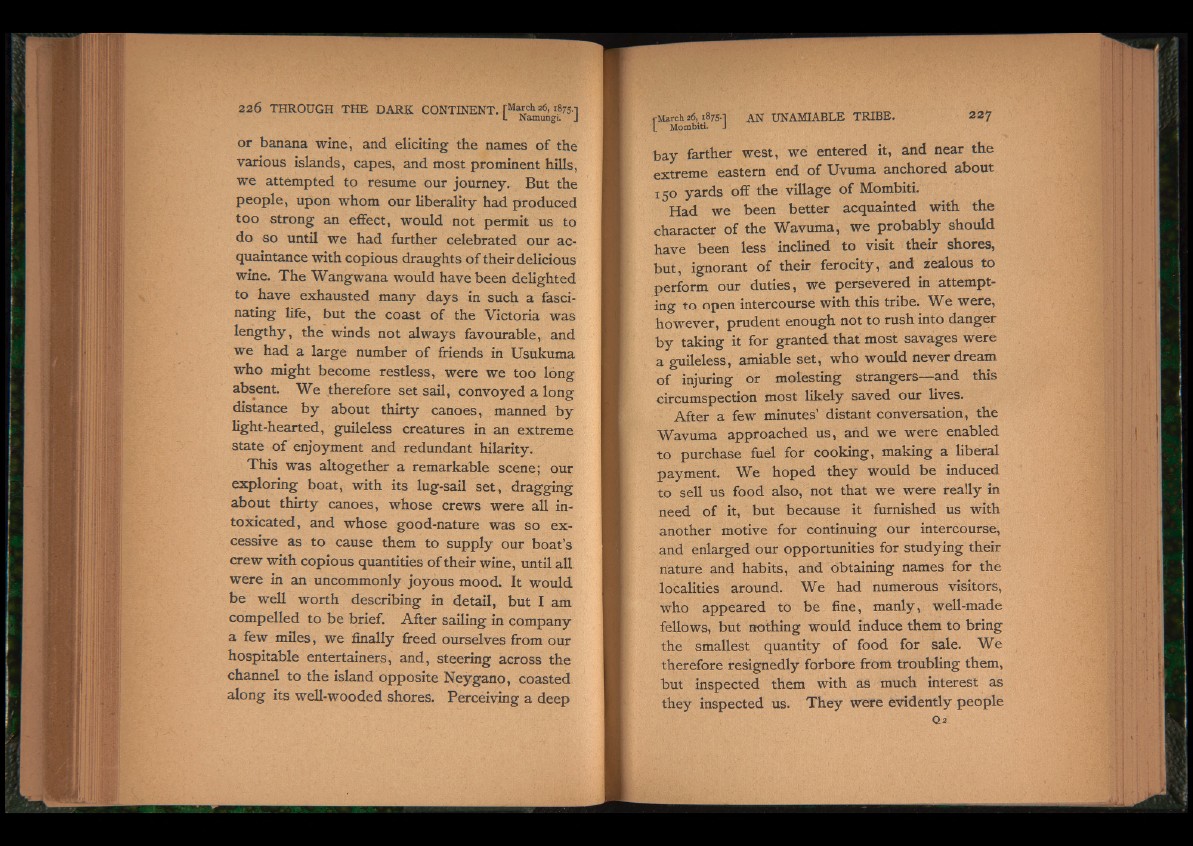
or banana wine , and eliciting the names o f the
various islands, capes, and most prominent hills,
we attempted to resume our journey. But the
p eop le, upon whom our liberality had produced
to o strong an effect, would not permit us to
do so until we had further celebrated our acquaintance
with copious draughts o f their delicious
wine. T h e Wangwana would have been delighted
to have exhausted many days in such a fascinating
life, but the coast o f the Victoria was
len g th y , the winds not always favourable, and
we had a large number o f friends in Usukuma
who might become restless, were w e too long
absent. W e therefore set sail, convoyed a long
distance b y about thirty canoes, manned b y
light-hearted, guileless creatures in an extreme
state o f enjoyment and redundant hilarity.
This was altogether a remarkable scene; our
exploring boat, with its lug-sail s e t, dragging
about thirty canoes, whose crews were all intoxicated,
and whose good-nature was so e x cessive
as to cause them to supply our boat’s
crew with copious quantities o f their wine, until all
were in an uncommonly jo y o u s mood. It would
be well worth describing in detail, but I am
compelled to be brief. A fter sailing in company
a few miles, w e finally freed ourselves from our
hospitable entertainers, and, steering across the
channel to the island opposite Neygano, coasted
along its well-wooded shores. Perceiving a deep
r March j6 , 1875.1 AN UNAMIABLE TRIBE. 2 27
i Mombiti. J
b ay farther west, we entered it, and near the
extreme eastern end o f Uvuma anchored about
150 yards off the village o f Mombiti.
Had we been better acquainted with the
character o f the Wavuma, w e p rob ably should
have been less inclined to visit their shores,
but, ignorant o f their ferocity, and zealous to
perform our duties, w e persevered in attempting
to open intercourse with this tribe. W e were,
however, prudent enough not to rush into danger
b y taking it for granted that most savages were
a guileless, amiable set, who would never dream
o f injuring or molesting strangers— and this
circumspection most lik e ly saved our lives.
After a few minutes’ distant conversation, the
Wavuma approached us, and we were enabled
to purchase fuel for cooking, making a liberal
payment. W e hoped th ey would be induced
to sell us food also, not that w e were really in
need o f it, but because it furnished us with
another motive for continuing our intercourse,
and enlarged our opportunities for studying their
nature and habits, and obtaining names for the
localities around. W e had numerous visitors,
who appeared to be fine, manly, well-made
fellows, but nothing would induce them to bring
the smallest quantity o f food for sale. W e
therefore resignedly forbore from troubling them,
but inspected them with as much interest as
th ey inspected us. T h e y were evidently people
0.2